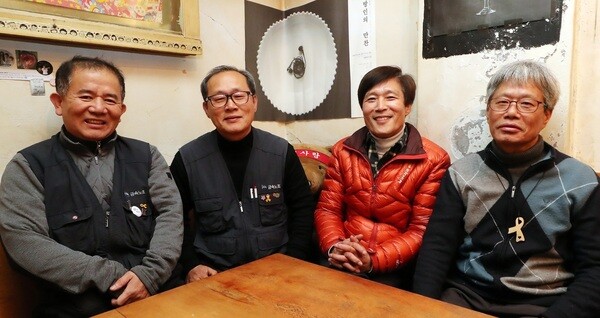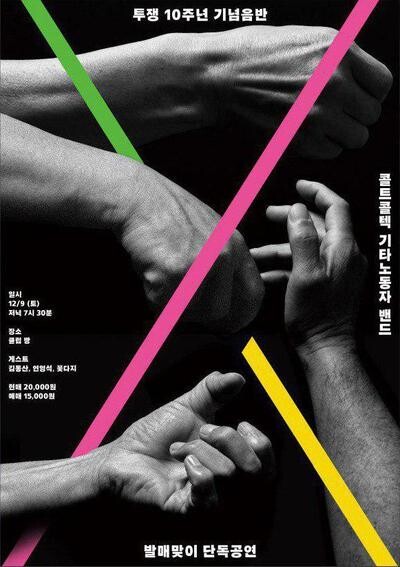hankyoreh
Links to other country sites 다른 나라 사이트 링크
[Interview] Cort-Band celebrates 10th anniversary of fighting for labor rights

It`s hard to imagine a 10-year anniversary that is less fun to celebrate. The Cort Guitar Workers’ Band, called “Cort-Band” for short, released an album to commemorate the 10th anniversary of their struggle to be reinstated at their jobs. There are three musicians in the band: Lee In-geun on vocals and guitar, Kim Gyeong-bong on the electric bass and Lim Jae-chun on the cajón, a box-shaped drum.
In April 2007, Cort laid off 56 workers at its factory in Bupyeong, Incheon; that July, it shut down a factory in Gyeryong, Daejeon, firing 65 workers; and in 2008, it closed the Bupyeong factory and let the remaining 125 workers go. When these workers decided to fight their one-sided termination, none of them could have dreamed that their fight would last more than 10 years. So much time has passed that they now joke that as soon as they return to their jobs, it will be time to retire.
Cort Guitars (also known as Cor-Tek) was established with 2 million won of capital in the Seongsu neighborhood of Seoul in 1973, and since then it has grown into a massive company that controls a 30% share of the global guitar manufacturing market. But this growth came at workers’ expense. Employees frequently worked overtime without any extra pay in inhumane conditions – the windows were removed because of concerns that productivity would decrease if workers could look out the windows. This made the company owner, Park Young-ho, one of the 120 richest people in Korea. But he arbitrarily closed his South Korean factories and set up factories in China and Indonesia in order to produce guitars for cheaper wages.
The workers at Cort did everything in their power to resist the layoff and the closing of their workplace. Despite a wide range of protests – including two aerial sit-ins and hunger strikes, a self-immolation, an ongoing relay-style sit-in and hunger strike organized with the help of supportive citizens, protests overseas, the production of a documentary film and the publication of a book – the Cort corporate headquarters and Park himself remain intransigent.
The Cort-Band was born as one such form of protest. A 2011 screening of the documentary “Dream Factory” (directed by Kim Sung-kyun, the film tells the story of the Cort workers) featured a congratulatory performance by the ska band Kingston Rudieska. After the concert, the band’s manager, Han Guk-jin, gave the workers a half-serious talking to: “What have you been doing for the past five years? If you had learned an instrument and shared your story through music, wouldn’t it have been a little easier to get your message across to the public?”

But the more the workers thought about it, the more feasible it seemed. “Ordinary people try to keep their distance from most protests, right? We figured it might be better to raise awareness of our situation through a cultural event, so we decided to give it a try.”
The band’s first show was held at Club Bbang, near Hongik University in Seoul’s Mapo District, in Dec. 2012. The band members went into their first show determined not to get anything wrong, rather like new recruits on the first day of boot camp. During that first show, they were so nervous that they sweat profusely and couldn’t see anything in front of them, but over the past five years they have become more confident and written four of their own songs.
The band’s four original compositions tell the story of their struggle over the past decade. “The House of the Seocho Neighborhood Fortune-Tellers” contains the lyric “fourteen fortune-tellers in black robes.” This is a jab at the 2014 ruling by the Supreme Court in favor of Cort, which the judges said had been justified in letting its workers go because of the coming financial crisis.
“The Spell” is a song that riffed on what Kim Gyeong-bong used to say during every demonstration. The lyrics cast a spell on Cort’s owner, Park: “You will have to life a life of desperation, groaning in pain that is hundreds and thousands of times worse than the lives of your workers.”
“Aerial” was written as Lee In-geun, the band’s guitarist, recalled the aerial protest back in 2008. The lyrics “Around the time that dark and light converged / I rose into the sky, clinging to the spikes of the steel column” could only have been written by someone who had experienced this personally.
“Was There a Dream?” put music to a poem written by Bang Jong-un, leader of the Cort labor union chapter. At the end of the album, Ban even recites one of his poem, titled “Fighting Is Winning.” The poem ends with the lines “By changing a single person who stood by and pretended not to know / We won even while it seemed we were losing.” Just like these lines, the band members continue to fight.
Even now, the band members hold an assembly in front of the company office every Thursday and put on a show at their protest tent in Gwanghwamun every Tuesday. On the second Thursday of every month, they hold a Catholic mass, and on the last Wednesday they hold a concert at Club Bbang along with indie musicians. In the words of Bang, the band members “don’t get tired and don’t give up.”
On this album, the Cort-Band did another rendition of the song “Mr. Lee, Do You Think I’ll Do Whatever You Say?” by Yeon Yeong-seok, a protest singer. This was a song they performed during their first show at Club Bbang. The lyrics in the intro – “50 hours, 60 hours, 70 hours, 80 hours of hard times” – represent the time the band members spent on the job. The song’s chorus was originally the same as its title, but the band members have adjusted it slightly: “Mr. Park, do you think we’ll do whatever you say?”
By Kim Hak-seon, music critic
Please direct questions or comments to [english@hani.co.kr]

Editorial・opinion
![[Column] Park Geun-hye déjà vu in Yoon Suk-yeol [Column] Park Geun-hye déjà vu in Yoon Suk-yeol](https://flexible.img.hani.co.kr/flexible/normal/500/300/imgdb/original/2024/0424/651713945113788.jpg) [Column] Park Geun-hye déjà vu in Yoon Suk-yeol
[Column] Park Geun-hye déjà vu in Yoon Suk-yeol![[Editorial] New weight of N. Korea’s nuclear threats makes dialogue all the more urgent [Editorial] New weight of N. Korea’s nuclear threats makes dialogue all the more urgent](https://flexible.img.hani.co.kr/flexible/normal/500/300/imgdb/original/2024/0424/7317139454662664.jpg) [Editorial] New weight of N. Korea’s nuclear threats makes dialogue all the more urgent
[Editorial] New weight of N. Korea’s nuclear threats makes dialogue all the more urgent- [Guest essay] The real reason Korea’s new right wants to dub Rhee a founding father
- [Column] ‘Choson’: Is it time we start referring to N. Korea in its own terms?
- [Editorial] Japan’s rewriting of history with Korea has gone too far
- [Column] The president’s questionable capacity for dialogue
- [Column] Are chaebol firms just pizza pies for families to divvy up as they please?
- [Column] Has Korea, too, crossed the Rubicon on China?
- [Correspondent’s column] In Japan’s alliance with US, echoes of its past alliances with UK
- [Editorial] Does Yoon think the Korean public is wrong?
Most viewed articles
- 1[Guest essay] The real reason Korea’s new right wants to dub Rhee a founding father
- 2Why Korea shouldn’t welcome Japan’s newly beefed up defense cooperation with US
- 3[Column] ‘Choson’: Is it time we start referring to N. Korea in its own terms?
- 4New AI-based translation tools make their way into everyday life in Korea
- 5[Column] Park Geun-hye déjà vu in Yoon Suk-yeol
- 6Senior doctors cut hours, prepare to resign as government refuses to scrap medical reform plan
- 7Opposition calls Yoon’s chief of staff appointment a ‘slap in the face’
- 8Will NewJeans end up collateral damage in internal feud at K-pop juggernaut Hybe?
- 9Terry Anderson, AP reporter who informed world of massacre in Gwangju, dies at 76
- 10Thursday to mark start of resignations by senior doctors amid standoff with government